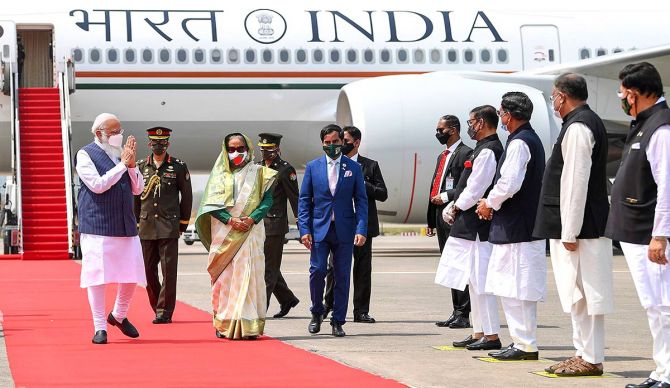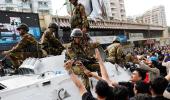'The dominance of her party also meant that the institutions became lopsided -- whether it was the bureaucracy or the courts or the military.'
'She centralised power to the extent that you would see her representatives or her party office bearers having overly represented in these institutions.'
'That perhaps would have been the biggest blunder that she committed.'

Harsh V Pant -- Professor of International Relations at the King's India Institute at King's College London and Vice President -- Studies and Foreign Policy at the Observer Research Foundation, New Delhi discusses the fall of Sheikh Hasina, how the political volatility and the rise of Islamic fundamentalism could impact Bangladesh's relationship with India, and why India should ensure a safe haven for the ousted Hasina.
The first part of an illuminating interview with Prasanna D Zore/Rediff.com
Was Sheikh Hasina's ouster always written on the wall when she took over as Bangladesh's prime minister this January for the third time?
It's difficult to say. When she was elected in the last election (in December 2018) there was lot of opposition and the BNP (the Opposition Bangladesh Nationalist Party headed by Khaleda Zia; she had been jailed since 2018 in a corruption case but soon after Sheikh Hasina's ouster her release was ordered by President Muhammad Shahabuddin) had not participated in those elections as well.
It was not entirely evident that it (Sheikh Hasina's fall) would be this dramatic; there was a lot of pressure on her before the elections and despite that she survived the elections.
She managed to conduct elections. She managed to come back to power and there was relatively little activity happening as far as the Opposition was concerned, perhaps lulled people into thinking she has managed to come for another time and it will continue like in the past.
But definitely there was disaffection and a growing desire for a more representative democracy, which she could not perhaps comprehend.
Were elections under her tenure in Bangladesh free and fair? Were political opponents allowed to participate freely?
They were not. There were disagreements between her and the Opposition. Initially, of course, she came to power backed by relatively free elections. Once in power, she felt cornered by the Opposition at times; there were also attacks on her personally.
That made her feel like she was backed into a corner and at times she took decisions that really went overboard when it came to managing the Opposition. And that meant that she really ensured the Opposition did not have the same space as perhaps the Awami League (Sheikh Hasina's party) had.
There were problems in the way elections were conducted and that also led people to mobilise against her. The Opposition also was very antagonistic (towards Hasina) in some ways. There was a lot of violence last time -- not this election, but the last election (in 2018) -- and she used that as a pretext to curtail the space for the Opposition.
What major blunders underline her 15-year long tenure at the helm of Bangladesh that has brought anarchy to India's eastern neighbour? Would anarchy be the apt description to describe the current turmoil in the country?

There is certainly chaos at the moment; we will have to wait and watch how the interim government (now headed by Nobel Laureate Muhammad Yunus) manages to bring it (the violence against leaders and supporters of Sheikh Hasina's Awami League and the Hindu and other minorities in Bangladesh) under control and what kind of institutions they (the Awami League) wrecked, because 15 years is a long time in politics.
For those 15 years the Awami League was in power in Bangladesh (Sheikh Hasina has been in power since 2008).
There would be lot of the institutions in Bangladesh where Awami League supporters would be present. How do you then develop newer institutions?
Do you really pick Awami League supporters and ostracise them and dismantle the existing institutions? How do you build your institutions? That would be a bigger issue and that highlights the problems that Hasina was not able to solve.
Talking of blunders what she could not do was to allow genuine democracy to flourish. She could not give space to the Opposition.
In some ways, the dominance of her party also meant that the institutions became lopsided -- whether it was the bureaucracy or the courts or the military. She centralised power to the extent that you would see her representatives or her party office bearers having overly represented in these institutions.
That perhaps would have been the biggest blunder that she committed.
As far as India is concerned, she was very good and there wasn't any blunder. The blunder perhaps was that she did not heed this occasional advice from India to give space to the Opposition, which India continued to give her.
It is also important to underline that when she came to power 15 years back, Bangladesh was in a very bad state. It was politically volatile, polarised. Bangladesh has had extremism raging. Bangladesh had Islamist fundamentalism raging within its borders. Bangladesh has had no political stability.
Economic governance was in tatters.
While it is easy now to talk of blunders, it is also important to recognise that she also gave 15 years of political stability to Bangladesh, which also resulted in Bangladesh becoming one of the fastest growing economies in the developing world.
That is also her contribution. That she could not take people on board in so many ways has created problems.
Now we will see whether those who have now come to power will be able to manage the same challenges.
Now that Nobel Laureate Muhammad Yunus heads the interim government do you see a smooth political transition taking place in Bangladesh given the political violence against the workers and leaders of the Awami League and the minorities in that country?

At the moment, the situation is very volatile.
In theory it sounds very nice that you have a Nobel Laureate running a government or heading a government. Politics is a different matter. You have to take care of all the stakeholders in politics.
At the moment, the polarisation is so deep that the Awami League is being targeted, their supporters are being targeted. The Awami League is a big part of Bangladeshi society. If you are targeting one part of your society, how can you build a Bangladesh that reconciles differences?
So you will have Jamaat-e-Islami (an Islamic fundamentalist party in Bangladesh led by exiled leader Abbas Ali Khan; the JeI envisages creation of an Islamic State in Bangladesh) on the one side, and the BNP on one side, which are relatively extremist groups, and you have the Awami League being targeted.
I don't know what political capital Mr Muhammad Yunus has to bring these fractious sections of Bangladeshi society together.
Will the Bangladesh army's backing to Mr Yunus help in the smooth transition of political power?
I don't see any problem with the formation of an interim government. The essential question would be the other members of the interim government. If you really want to build a cohesive society and reconcile differences, then among those 15 people, there should be some representation for the Awami League also. I doubt very much whether that is going to happen.
I am a bit sceptical about this argument that somehow Mr Yunus and the 15-member team are going to build a new Bangladesh on the ruins of present day polarisation.
- Part 2 of the Interview: 'Pakistan Will Want To Use Bangladesh Situation To Its Advantage'











 © 2025
© 2025